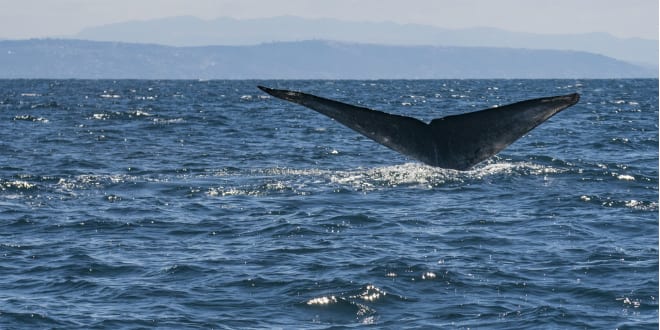Two sperm whales, a mother and her calf, were sighted about four miles off the coast of northern Israel ten days ago
This was the first confirmed sighting of a sperm whale in Israeli territorial waters since the Israel Marine Mammal Research and Assistance Center, a non-profit organization dedicated to the study and conservation of cetacean populations that inhabit the Eastern Mediterranean and the Gulf of Eilat, began its research in 1993.
Normally thought of as an arid country, water plays a major role in Biblical descriptions of the Messianic process leading the multitude of recent sightings of marine life to take on more than a simple scientific significance. This was especially noted by the Prophet Ezekiel.
And it shall come to pass that fishers shall stand by it from En-gedi even unto En-eglaim; there shall be a place for the spreading of nets; their fish shall be after their kinds as the fish of the Great Sea exceeding many. Ezekiel 47:10
The fish of the sea, the birds of the sky, the beasts of the field, all creeping things that move on the ground, and every human being on earth shall quake before Me. Mountains shall be overthrown, cliffs shall topple, and every wall shall crumble to the ground. Ezekiel 38:20
The Tikunei Zohar (Tinyanya Tikkun 43), an esoteric book attributed to Rabbi Shimon bar Yochai in the first century CE, explains that this increase of fish signifies a specific stage of the Messianic process, in which the Messiah from the House of Joseph and the Messiah of the house of David, two separate stages, join together.
The Messiah from the house of Joseph is a practical building up of the land that precedes a miraculous period, Messiah from the House of David, which includes the building of the Temple. The period ushered in by the appearance of fish is described as a period of hamtakat hadinim (sweetening of the judgments), symbolized by the fish’s ability to make seawater potable.
The leviathan is referenced in the Bible in Job 3:8, Job 40:15–41:26, Psalm 74:13–23, Psalm 104:26, and Isaiah 27:1. Though the word ‘leviathan’ in modern Hebrew refers to whales, marine mammals that subsist on plankton, the term originated as a formidable fish in Jewish mythology. A section of the Talmud (the Oral Law) describes the post-Messianic role of the Leviathan. In the Tractate of Baba Batra 75a, it is written that God originally produced a male and a female leviathan. God became concerned that in multiplying, the species would destroy the world. God killed the female leviathan, preserving her flesh for the special banquet that will be given to the righteous on the arrival of the Messiah. The banquet will be held inside a huge tent made from the Leviathan’s skin.
This midrash (homiletic teaching) is the source of an unusual blessing recited during the holiday of Sukkot (Feast of Tabernacles), in which we recite upon leaving the sukkah (tabernacle): “May it be your will, Lord our God and God of our forefathers, that just as I have fulfilled and dwelt in this sukkah, so may I merit in the coming year to dwell in the sukkah of the skin of Leviathan. Next year in Jerusalem.”
There has been a recent spate of sightings of remarkable marine wildlife. In May, a pod of about 20 Bottlenose dolphins was spotted by marine inspectors from Israel’s Nature and Parks Authority off the coast of Ashkelon. Last month, a whale shark, the world’s largest fish, appeared off of the beach of Eilat. In February, a killer whale, also known as an orca, was spotted almost one mile off the coast of Israel between Haifa and Akhziv.
Every winter a group of 20-30 dusky and sandbar sharks, referred to as a ‘frenzy,’ gather off the coast of Hadera. The sharks are becoming increasingly rare as the Mediterranean suffers from overfishing. Though this has been witnessed for several decades, scientists only began studying the phenomenon and collecting data two years ago.
Source: Israel in the News

